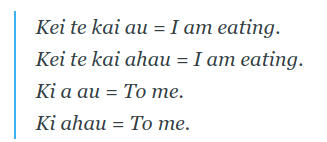"au" vs "ahau" in te reo Māori
There was a discussion in an online NZ Māori language Facebook group about the different forms of the first person personal pronoun - that is the personal pronoun that refers to "I, me" in English. The question raised was which form do people prefer - au or ahau.

There was a discussion in an online NZ Māori language Facebook group about the different forms of the first person personal pronoun - that is the personal pronoun that refers to "I, me" in English.
The question raised was which form do people prefer - au or ahau. In conversational Māori these are often used interchangeably:
Kei te kai au = I am eating.
Kei te kai ahau = I am eating.
Ki a au = To me.
Ki ahau = To me.
I'm a relative beginner in te reo Māori and swap between au and ahau based on what sounds best to me when saying the sentence. The comments in the thread varied between taking a similar approach or using one over the other based on dialect and regional variations in language. One suggested rule of thumb was that au be used where the personal article a is not required, and ahau where it is, to replace a au. From the examples above, these would be the preferred form if using that rule of thumb:
Kei te kai au
Ki ahau
Consulting the experts
I thought it would be interesting to look through some of the reference books and see what the consensus is, if there is one.
Winifred Bauer
Winifred Bauer's "Maori : Descriptive Grammars Series", section 2.1.2.1.9, "Pronouns for tribal affiliation", has this to say on the subject (the * prefix to an example represents an invalid syntax):
The variation between au and ahau seems to be found in all dialects, although the two forms may differ in frequency from dialect to dialect. Ahau almost certainly derives from the personal article a + au, with epenthetic insertion of h. Ahau cannot follow the personal article: compare ki a au, ki ahau but *ki a ahau. Some dialects have awau for ahau.
Here we can see that ahau may have formed from the sound of a au over time. In te reo Māori when multiple vowels follow each other the sound blends into the other without a pause even if they are in different words.
Ray Harlow
Ray Harlow in "A Māori Reference Grammar", section 3.2.1.1.4, "Pronouns" mentions that one usage is preferred over the other depending on region:
Northern dialects tend to use ahau for the 1st person singular, against au elsewhere.
Bruce Biggs
Bruce Biggs in "Let's Learn Maori" also mentions the dialectial difference (Section 9.5, dialectal variation):
In North Auckland the first person singular pronoun is usually ahau [...]
In all areas the forms wau and awau may be heard instead of au, ahau particularly after words ending in "o" or "u" (as ko wau, it is I, but the practice is not restricted to such positions.
In Section 10.3, "Pronunciation note", Biggs further adds:
Notice also that while ahau never requires the personal article, its dialectal variant au does. Au preceded by a is pronounced āu, but written as a au. This follows from the general rule of pronunciation, that adjacent vowels in the same phrase are pronounced as a single long vowel.
Ian Cormack
Ian Cormack, a noted te reo Māori expert and author, posted on twitter a while back about the same topic:
'i a au', 'i āu', 'i ahau' (or 'i awau' (Ngāti Porou), i awahau (Te Whānau-a-Apanui, Ngāti Porou) are all correct here. Kei a koe te tikanga😀
Differences around the Pacific
I was curious what other Pacific languages use for the first person personal pronoun to see if they have the same different forms. From a quick look through some books I have on the languages of Niue, Fiji, and Rarotonga, they also use au.
Tahitian on the other hand has au and vau. From D. T. Tryon's book, "Conversational Tahitian" (lesson 7, The Pronoun):
There are two forms of the first person singular pronoun, au and vau. Au is used after words ending in -e or -i, while vau is used elsewhere. In conversational Tahitian, however, vau may replace au at any time.
The choice of usage of vau based on the ending of the previous word is similar to what Biggs noted about the use of wau and awau. The Tahitian and Māori languages are similar and the Tahitian "v" is used where Māori would use "w". For example, vahine in Tahitian and wahine in Māori translate to the English word "woman".
Conclusion
The intent of this post wasn't to find a "correct" usage of au vs ahau, but to learn more about the difference and perhaps the history of it. There's not much to conclude other than to use the way you are being taught, follow the dialect that you're learning, and if in doubt, pick what sounds good for the sentence you are speaking. The important thing is to kōrero Māori, ia rā ia rā (speak Māori each and every day).
Discuss this post on the /r/strandedio subreddit.
